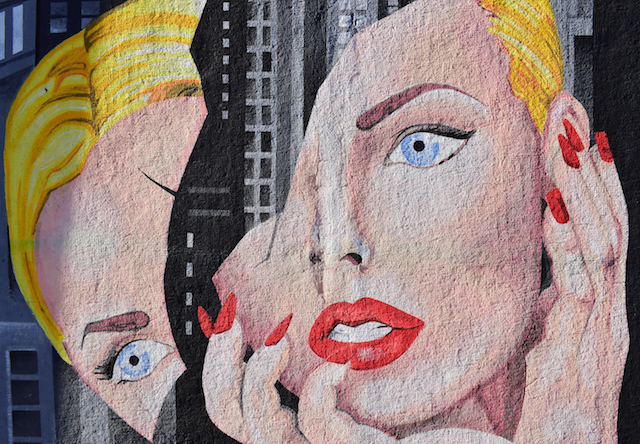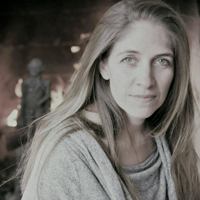
We often like to get stuck at the places where our lives derailed.
We spend too much time thinking about those who told us we were stupid or abandoned us at an early age, and why we believed them. But to me, it matters less where our belief systems come from, and more whether or not they serve us.
Are they taking us where we want to go?
How we tell our stories profoundly changes our perceptions of ourselves and our lives. Whether we use the language of neuroscience, psychology, energy, or spirituality, the underlying idea is the same—the voices in our head are powerful.
If we believe we are weak, not capable, uninteresting, slow, uncoordinated, cursed, unlucky, unloved, or always struggling, we will see those themes show up in our lives, time and time again. On the flip side, if we believe we are divine stardust, loved, powerful, intelligent, creative, blessed, worthy, and capable of anything, those themes show up, time and time again.
Our stories and our voices not only change how we view our present, but also how we view our future. It changes which hopes and dreams we allow in. It changes whether or not we believe we are capable of achieving our dreams. This perspective answers the question of whether or not love, happiness, excitement, passion, healing, or success are things we let in or push away because we don’t believe they’re ours to have.
I’m a life coach. My particular niche is alchemy with personal narratives as a professional story transformer. I work with many themes—birth, death, breakups, awakenings, childhood, and trauma.
My clients show me their ick, their fears, and the hopes and dreams they’re afraid to want. They bring their baggage and their oldest wounds. Then we unfold their stories and belief systems until they see what I see: their beauty. We unfold their divinity, the gorgeousness of their journey, and the rainbow they may have missed while hiding from the storm.
Of all the stories and narratives I work with, trauma in any form may be my favorite.
There are so many experiences of trauma I’ve heard about over the years. Stories involving poverty, car accidents, chronic pain, cruel lovers, war, rape, alcoholic parents, and bullying. I’m drawn to these stories because trauma is less about the actual event, and more about the person experiencing the event.
If the brain can’t integrate the experience, if there’s no blueprint or help in sight, any experience can cause trauma. We are all different and we each experience life through our own unique lens, so there’s no way to know in advance which event will be categorized as trauma by an individual.
What happens during and after trauma isn’t logical or rational. And there’s definitely no straight line when it comes to healing trauma. But since everyone (yup, everyone) has experienced trauma, we’re all in a state of continuous healing and growing. What makes it fascinating is how it can morph from person to person, trauma to trauma, and even change how it shows up in our lives as layers are peeled back. Trauma is often so embedded in us that we have a hard time even seeing all the patterns and belief systems created by it.
I spend a lot of time thinking about how common trauma is, and how much it affects our lives. There are so many insidious ways wounding can sneak into our perceived limitations, our belief systems, and our deepest shame. The stories around our trauma can make us feel crazy, or not enough—they can even cause us to be misdiagnosed as physically or mentally ill. Trauma can show up as addiction or narcissistic behavior, nightmares or hard-to-define triggers.
Everyone is carrying some trauma—and unfortunately, much of it shows up as behavior that we as a society have deemed unacceptable or unwanted. Of course, this makes it even harder to share, talk about, or heal.
Our fear is often that showing a wound this metaphorically bloody will make us unlovable, abandoned, or shunned. This often plays out as a tragic, self-fulfilling prophecy. Because when we don’t acknowledge and heal our pain, it comes out anyway. It comes out in depression, rage, illness, numbing behaviors, and so many other behaviors.
The truth is that all of us have felt pain, and we can empathize where another is at when they say they are hurting.
The best part of my work is the knowing that our trauma can also be the amazing thing that cracks us open and illuminates our superpowers. Even as it can be the thing that brings us to our knees, it can also be the thing that grows our clarity, our compassion, our love for ourselves and each other.
When we’ve played with it and processed it, rewritten it and found a way to let it be seen and accepted, it allows us to be lighthouses. We can illuminate the rocks and help one another find safe harbor. We can give ourselves and each other the space and compassion and understanding to heal. We can re-frame our stories, and ourselves, from a place of power.
This power doesn’t always (or even often) look and feel like superhero skills—at least not right away. But it does look like not hurting as much. Not being triggered as easily. Sleeping better. Finding more joy. Feeling more comfortable being vulnerable. Not wanting to abuse substances or numb out. Feeling safer taking risks. Trusting ourselves to trust others.
Slowly but surely, this leads to superhero capes and the ability to fly.
Once we’ve been able to take back our personal power, once we’ve transformed our story with great love and care and made it our own, we sadly won’t get a gold medal—though we should. The nightmares may still come. The triggers may still rear their ugly heads. Glitter won’t rain down from the sky.
What does happen though is a deeper transition and acceptance. Once we master loving our journey, it’s easier to accept and love our trauma and the reactions that stem from it. Which means yes, even getting to a place of feeling great appreciation for being in a triggered state.
Whatever experiences caused our traumas, can also cause us to grow. However we choose to heal causes us to grow. We learn who we are, how we operate, and how strong we really are. And that knowledge really is where superhero skills come from.
We all get to choose. These are some questions we can ask ourselves about how we choose to heal and grow:
How do we tell our story?
Are we even aware of how we tell our story?
What language do we use to tell our story?
Do we choose fear or love? Understanding and openheartedness, or judgement and walls? To see the world through the eyes of joy and beauty, or the eyes of shame and victimhood?
When we make these choices, which lens do we point in our own direction? Which story do we tell ourselves about ourselves?
We get far more power in these choices than we give ourselves credit for.
We each have the birthright of making our lives joyful, purposeful, and loving—no matter what is occurring currently or has occurred previously. There may be some sh*t to handle (there usually is), and that’s okay.
Our goal is to work to heal and change our story. And to recognize that neither the daily struggles or the hardcore trauma can keep us down for long.
Once we accept this, the rest of our life can unfold with more joy and freedom than we thought possible.
~
“We all live with the objective of being happy. Our lives are all different and yet the same.” ~ Anne Frank
~
~
Author: Jenn Reddy
Image: Chris Barbalis/Unsplash
Editor: Nicole Cameron
Copy Editor: Catherine Monkman
Social Editor: Waylon Lewis






Read 0 comments and reply